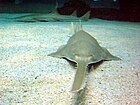Endangered Wildlife Trust

The Endangered Wildlife Trust (EWT) is a non-governmental, not-for-profit South African conservation organisation. Founded in 1973, the EWT has an expanding footprint throughout southern and East Africa, focussing on the conservation of threatened species and ecosystems. The EWT implements research and conservation action programmes, implementing projects that address the threats facing species and their habitats, and support sustainable natural resource management.[1]
Vision[]
The Endangered Wildlife Trust's vision is that of a healthy planet and an equitable world that values and sustains the diversity of all life.
Mission[]
Conserving threatened species and ecosystems in east and southern Africa, to the benefit of all people.
Strategy[]
The Endangered Wildlife is guided by three strategic imperatives that form the key pillars of conservation impact:
Saving species[]
Take action to conserve threatened wildlife
Conserving habitats[]
Conserve threatened habitats to uphold ecosystem integrity.
Benefitting people[]
Drive the uptake of nature-based solutions for resilient livelihoods, business, and development.
Organisational structure[]
The EWT implements conservation research and action through 13 programmes, each specialising in and area of conservation importance, with a set of high-level objectives through which to achieve the overarching strategy of the organisation. Priority interventions implemented by the EWT programmes focus on identifying the key factors threatening biodiversity and developing and implementing solutions to reduce risk and reverse the drivers of species extinction and ecosystem degradation.
EWT programmes[]
- African Crane Conservation Programme (ACCP)
- Birds of Prey Programme (BoPP)
- Carnivore Conservation Programme (CCP)
- Conservation Science Unit (CSU)
- Drylands Conservation Programme (DCP)
- National Business and Biodiversity Network (NBBN)
- People in Conservation (PIC)
- Soutpansberg Protected Area (SPA)
- Threatened Amphibian Programme (TAP)
- Wildlife and Energy Programme (WEP)
- Wildlife and Transport Programme (WTP)
- Wildlife in Trade Programme (WiT)
- Vultures for Africa (VFA)
Publications and platforms[]
The EWT produces an online magazine entitles Conservation Matters every month, and a blog entitled Wild Diaries on an ad-hoc basis. The organisation is active on Facebook, Instagram, Linkedin, Youtube, Twitter and TikTok, and produces annual Integrated Reports.
References[]
- ^ "Endangered Wildlife Trust Integrated Report 2020" (PDF). Endangered Wildlife Trust.
External links[]
- Endangered Wildlife Trust - Official site.
- Environmental organisations based in South Africa
- Wildlife conservation organizations
- Environmental organizations established in 1973
- 1973 establishments in South Africa
- Charities based in South Africa
- Endangered biota of Africa


